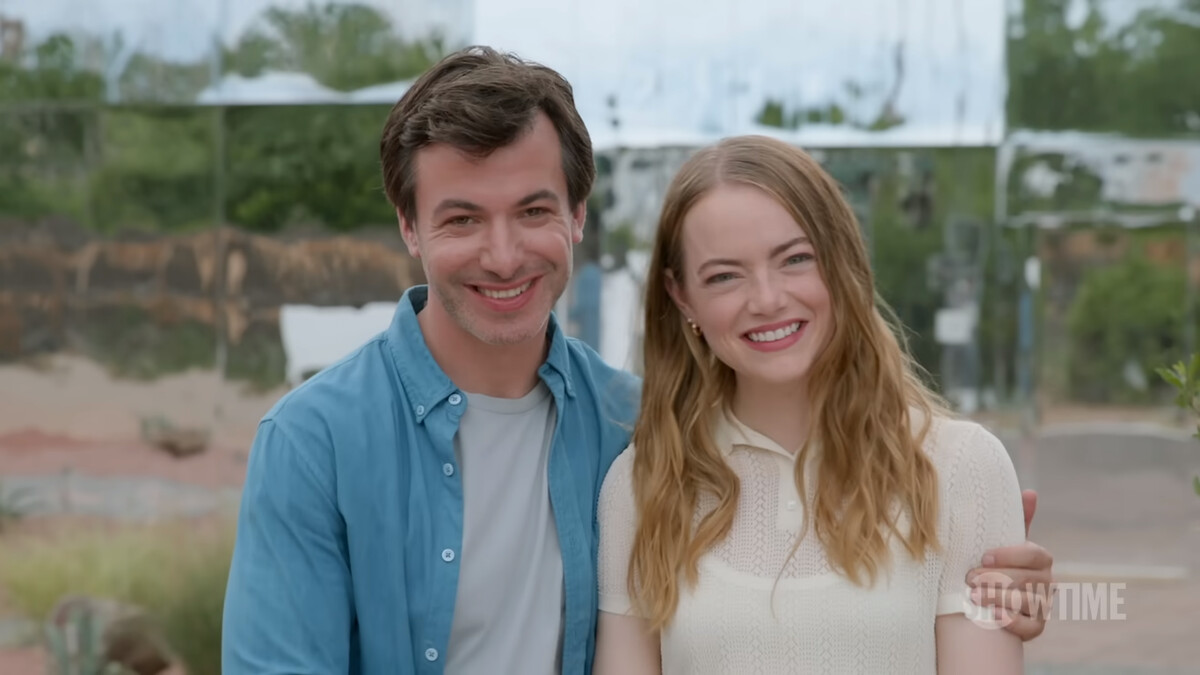
The television landscape has been graced with a new contender that boldly defies simplistic categorization – ‘The Curse’. This latest addition to the realm of dark satire demands the viewers’ undivided attention, partly shielding their gaze in anticipation of the cringe-worthy crescendos of discomfort it curates. Conceived and brought to life by Nathan Fielder, taking a dynamic leap from ‘The Rehearsal’ and joined by Benny Safdie, ‘The Curse’ introduces audiences to his first foray into a scripted series.
Sinking its hooks into viewers with a disarmingly uncomplicated premise, the series orbits around the lives of Whitney (portrayed by Emma Stone) and her husband, Asher Siegel (Nathan Fielder), celebrating their one-year anniversary. The couple stands juxtaposed against Whitney’s parents, Elizabeth (Constance Shulman) and Paul (Corbin Bernsen), who amassed a fortune through morally infirm real estate practices. Breathing the ethos of rebellion, Whitney seeks to distance herself from such underhanded means and aspires to serve society. Her mission: to resurrect a crime-infested, forsaken neighborhood in New Mexico into an enclave of inclusivity, featuring eco-friendly passive housing.
This transformative journey becomes content fodder for an HGTV reality show named ‘Fliplanthropy’, with Whitney and Asher at the helm as hosts. Enter Producer Dougie (Benny Safdie), who injects a relentless pursuit of action, drama, and conflict into what is otherwise perceived to be a rather mundane show by him and the not-so impressed focus groups.
The series takes a jarring turn when Dougie orchestrates a scene, compelling Asher to bestow money upon a young soda-selling girl named Nala (Hikmah Warsame). The scripted charity spirals into mayhem as Asher awkwardly tries to get change for the $100 bill he initially gives, only to ask for it back post-filming, leading to a painfully embarrassing ATM encounter. Predictably, the incident incites Nala to cast a ‘curse’ upon Asher – a minor spell that gained popularity on TikTok, as she reveals later. However, this is but a playful misnomer for a more profound curse afflicting the land and inhabitants, observed with a relentless, unflinching gaze by the show.
The gripping narrative reveals Whitney’s internal strife: her altruistic impulse to heal the planet and serve its denizens constantly clashing with veiled self-serving motives. Her belief in money as a universal solution stands in stark contrast to her aversion to the very conspicuous consumption she practices herself.
The series paints Whitney as a character whose obliviousness borders on the absurd. One such telling moment unfolds when Whitney proclaims a desire to prevent the neighborhood from becoming saturated with individuals bankrolled by affluent parents, a statement dripping with irony, given her background.
Parallel arcs of personal gain trace through other characters as well; Dougie, despite struggling with the loss of his spouse, shamelessly exploits his heartache for sympathy, and Asher’s vendetta against his former casino employer is equally tainted by personal vendettas.
Visually, ‘The Curse’ emulates the exaggerated style of reality television, utilizing mirrors as a thematic and stylistic motif of reflections and perceptions. Anchor in the midst of this tumultuous satire, Emma Stone delivers a powerhouse performance, though the show occasionally meanders through its approach, which might have benefited from a tighter narrative focus.
The series, while adeptly tackling themes of hypocrisy and moral dilemmas, occasionally stoops to low-brow humor, perhaps most notably in the form of ongoing penis jokes. Such crude attempts at laughter pose the question of genuine versus performative reactions to insensitive remarks made by others with differing experiences. This level of self-awareness is requisite for navigating ‘The Curse’, allowing an alternative for viewers to simply bask in Dougie’s stoned musings or Asher’s comedic escapades within the realm of corporate satire.
‘The Curse’ is presently available for streaming on Lionsgate Play, with its final three episodes scheduled to release on January 19, 2024. Engage with this series, not just as a mere spectator of the uncomfortable hilarity, but as a witness to a sharp critique on social pretense, morality, and the complexities of intent versus impact.










